On the heels of the Leading Together: The Campaign for Washington University announcement earlier this month, the university community will celebrate its 1853 founding during the Founders Day gala Saturday, Nov. 3, at the St. Louis Union Station Hotel.
The Alumni Association sponsors the annual event. For details and ticket information, call (314) 935-6503.
Included in the ceremony is a keynote address by former U.S. Secretary of Defense Robert Gates, PhD, presentation of this year’s Distinguished Faculty Awards (see below), the Distinguished Alumni Awards and the Robert S. Brookings Awards (which will be profiled in tomorrow’s Record).
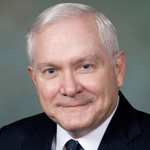
Gates was appointed the 22nd U.S. secretary of defense in 2006 by President George W. Bush. He continued serving in President Obama’s administration until he retired in 2011. This cabinet post was the capstone to a successful careers with the CIA, the National Security Council, and Texas A & M University, where he served as president from 2002-06.
Gates earned a bachelor’s degree in 1965 from the College of William and Mary, a master’s degree in history from Indiana University in 1966 and a doctorate in Russian and Soviet history from Georgetown University in 1974.
When Gates joined the CIA, he began a 26-year career in intelligence. From 1986-89, Gates served as CIA deputy director. This was followed by White House appointments as assistant to President George H.W. Bush and as deputy national security adviser. In 1991, he was named CIA director and served for two years.
Gates is the only career officer in the CIA’s history to rise from entry-level employee to director. His most significant honors include the Presidential Medal of Freedom, the country’s highest civilian honor, awarded by President Obama; the National Security Medal; the Presidential Citizens Medal; the National Intelligence Distinguished Service Medal (awarded twice); and the CIA’s highest award, the Distinguished Intelligence Medal (awarded three times).
In 1996, Gates published his memoir, From the Shadows: The Ultimate Insider’s Story of Five Presidents and How They Won the Cold War.
He has been on the board of directors of several companies and currently serves on the board of Starbucks. A lifelong supporter of the Boy Scouts of America, Gates has served on its national executive board and was president of the National Eagle Scout Association.
Distinguished Faculty Awards
Pratim Biswas, PhD, School of Engineering & Applied Science
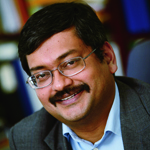
Pratim Biswas, PhD, the Lucy and Stanley Lopata Professor and chair of the Department of Energy, Environmental and Chemical Engineering in the School of Engineering & Applied Science, is internationally recognized for his contributions to addressing environmental and energy challenges. His research concentrates on the study of aerosol science and technology, specifically regarding nanoparticle technology, energy and environmental nanotechnology, air quality, and pollution control. His scholarship also extends to the thermal sciences.
He joined the Washington University faculty in 2000 as the Stifel and Quinette Jens Professor. One of Biswas’ first initiatives was to establish the Environmental Engineering Science program, a visionary plan so successful that it was extended university-wide.
His leadership in one of the university’s most significant initiatives, the McDonnell International Scholars Academy, includes membership on its steering committee; he also serves as the academy’s ambassador to the Indian Institute of Technology in Mumbai, India.
In addition, Biswas directs the McDonnell Academy’s Global Energy and Environment Partnership, a 28-university consortium charged with addressing global challenges in these two crucial areas. Added to these responsibilities is his role as a faculty scholar in the university’s Institute for Public Health, with the goal of creating crossdisciplinary collaborations.
As a teacher, he has prepared more than 35 doctoral students to continue important scientific discoveries in the fields of energy and the environment. His research has been published in more than 250 refereed papers and he has authored several book chapters.
Biswas participates in several national committees and conferences. He also has served on the board of directors and as a past president of the American Association for Aerosol Research.
After graduating with a BTech degree from the Indian Institute of Technology, Bombay, Biswas enrolled in the University of California, Los Angeles, where he earned a master’s degree in 1981; he earned a doctoral degree from the California Institute of Technology in 1985.
Ron R. King, PhD, Olin Business School
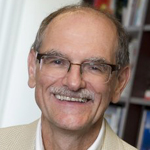
Throughout his quarter-century tenure at the Olin Business School, Ron R. King, PhD, has worn many hats and has taught in virtually every Olin accounting program. He has served in key administrative roles that have helped shape the school. He also holds a courtesy appointment in the School of Law, where he has taught financial accounting for lawyers.
His remarkable abilities in the classroom have been recognized by six Reid Teaching Awards and two BSBA Teacher of the Year honors.
His research interests center on economic analysis of legal issues in accounting and auditing markets, economics of information in markets and organizations, and experimental economics.
The significance of his scholarship in these fields is evidenced by the publication of more than 40 papers in distinguished professional journals. King has served as a board member and an associate editor for The Accounting Review, Auditing, Journal of Practice and Theory, Accounting Horizons, and Journal of Accounting and Public Policy.
As senior associate dean of faculty, he helped recruit 20 faculty members. As senior associate dean of programs, he oversaw the undergraduate, MBA/professional MBA, specialized master’s, and Executive MBA academic programs. This year, he took on the directorship of the Center for Experiential Learning and became senior associate dean of special projects.
After joining the Olin faculty in 1986 as an assistant professor of accounting, King rose through the ranks and received tenure in 1994. In 2002, he was named the Myron Northrop Professor of Accounting.
Outside of Washington University, King has served as expert witness for a number of corporations, and he is active in St. Louis’ start-up business community.
King earned bachelor’s and MBA degrees from the University of Wisconsin-La Crosse and his doctorate from the University of Arizona. In addition, he is a certified public accountant in Missouri.
Amanda Moore McBride, PhD, Brown School
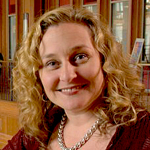
Amanda Moore McBride, PhD, associate professor of social work, is an international leader, teacher and scholar in civic and community engagement. Her work includes building international and national service initiatives, applying youth service as a component of youth development, and understanding and communicating the service mission of the academy.
As director of the Richard A. Gephardt Institute for Public Service, a position she has held since its 2006 inception, McBride promotes lifelong civic engagement of undergraduate and graduate students, and engages the university community through a variety of initiatives.
One of her successful innovations is the Civic Scholars Program, which combines civics education with leadership training; another is a process enabling community leaders to develop partnerships with WUSTL faculty and students.
In addition to serving as associate dean at the Brown School, McBride has major roles in two important initiatives: She is the research director for the Center for Social Development, where she helps develop and foster global initiatives for civic engagement and service; and she serves as a faculty fellow for WUSTL’s Institute for School Partnership, where her research focuses on the impact of WUSTL students’ community service in St. Louis city middle schools. McBride’s research involves the study of higher education’s role in international service efforts.
After earning a bachelor’s degree in psychology from Hendrix College in 1993, she worked briefly for the United Way of Greater St. Louis, then pursued graduate studies at Washington University, earning master’s and doctoral degrees in 1995 and 2003, respectively. She has been honored for her teaching and mentoring and recently received an Outstanding Young Alumna Award from Hendrix College.
Marcus E. Raichle, MD, School of Medicine
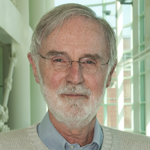
Marcus E. Raichle, MD, professor of radiology, of neurology, of neurobiology, and biomedical engineering, is internationally renowned for his contributions to advancing the frontiers of cognitive neuroscience.
His pioneering research helped develop the fundamental tools positron emission technology and functional magnetic resonance imaging, which are used to visualize mental activity in the human brain, thus paving the way for great advances in the understanding of how the brain works.
Another major medical development in Raichle’s laboratory was the discovery of brain regions, now known as the default mode network. His research has found this region to be among the first areas of the brain affected by Alzheimer’s disease, which could aid in its early detection.
Raichle earned bachelor’s and medical degrees from the University of Washington in Seattle in 1960 and 1964, respectively. After completing an internship and medical residency at Baltimore City Hospitals as well as a residency in neurology at the Cornell University Medical Center in New York City, he enlisted in the U.S. Air Force as a major.
In 1971 he joined Washington University’s Department of Neurology and the Mallinckrodt Institute of Radiology and became a full professor within seven years. Raichle also teaches neurobiology, biomedical engineering and psychology. He is a neurologist emeritus at Barnes-Jewish Hospital of St. Louis. In 1999, he received Washington University’s Carl and Gerty Cori Award for Faculty Achievement.
His many professional honors include membership in the National Academy of Sciences and the Institute of Medicine and fellowship in the American Academy of Arts & Sciences and the American Association for the Advancement of Science.